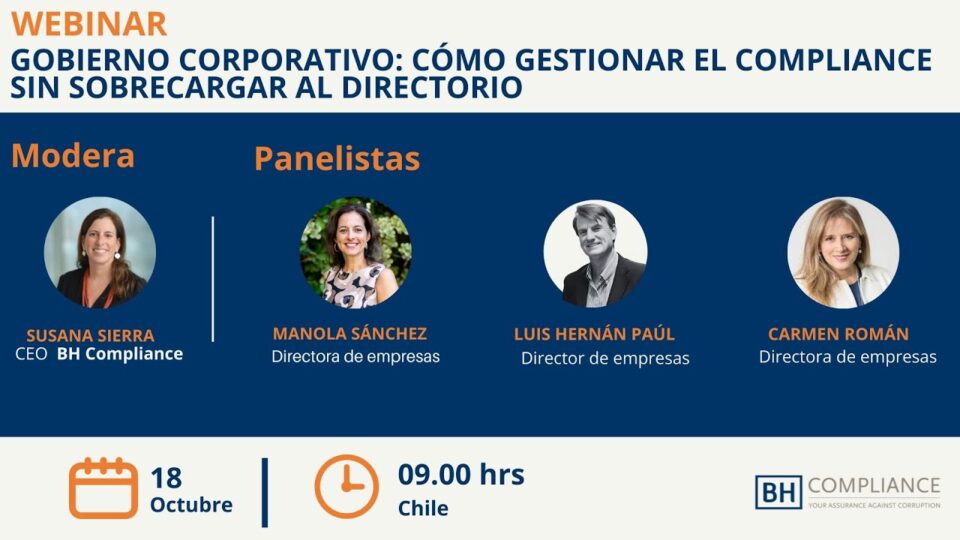
Compliance has taken a central role in the board’s priorities, driven by new regulations, pressure from companies to comply and the emerging risks they face today. It is therefore critical that boards manage compliance efficiently, without overburdening their members, to maintain the company’s strategic focus and not divert their attention from their core functions.
To address this issue, we conducted the webinar “Corporate Governance: How to manage compliance without overloading the Board”, which featured company directors Claudia “Manola” Sanchez and Carmen Roman, and was moderated by our CEO; Susana Sierra.
It was a conversation where the panelists addressed the challenges they have faced in this regard and what are the most important points to be addressed by companies, from their boards, to have an effective compliance that does not mean more bureaucracy.
Susana Sierra opened the webinar by mentioning how the new regulations of recent times, together with the current institutional crisis, have put compliance in the spotlight. In this context, she highlighted the importance of the board of directors being attentive and integrating it fully into the corporate governance of companies.
Manola Sanchez mentioned the importance of facing new regulations and norms in a simple and direct way, addressing the gray areas where there are doubts and questions on the part of workers. She also emphasized the need to constantly question and analyze statistics, whether good or bad, because often the pressure to maintain leadership or economic success can divert some behaviors. It is therefore essential to review where the weakest flanks are and strengthen them.
For her part, Carmen Román stressed that all chief executives and directors should be clear about their five main risks. This reflection reveals the level of importance given to prevention and the promotion of integrity, as well as the way in which compliance is approached. It also underlined the relevance of prevention and training, not only for internal members of the organization, but also for third parties, such as suppliers.
Both stressed the importance of generating trust to evaluate organizational culture, especially in the current context of the crisis of trust. In this regard, the Edelman Barometer was mentioned, which indicates that companies have a better evaluation compared to other institutions, both public and private. This reflects that, to the extent that companies act correctly, they are able to generate trust. In addition, the relevance of leaders in promoting trust in companies and generating greater commitment from the rest of the team was highlighted, for which effective communication is essential, since leaders must not only focus on objectives and numbers, but must also have special leadership and communication skills. In this sense, it is the leaders who pass on the culture of integrity to the entire company. Education and training play a key role in creating a culture where everyone is aligned.
On the occasion, the role of the Responsible Parties, according to the new Law on Economic Crimes, was highlighted, who today acquire greater responsibilities leading compliance, so they must have the necessary conditions to perform their work effectively, which includes more resources for the area, but also a better salary given their important role.
Finally, the importance of measuring in order to manage and improve was highlighted. Carmen pointed out that it is essential that the results are shown in the most understandable way possible, ideally with a traffic light system, so that all the directors can understand it, while Manola indicated that it is very important to record the data, because the more cases there are, the more they can check where the weak points are in order to manage and improve.










